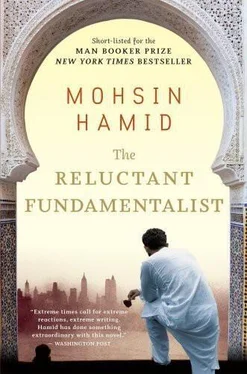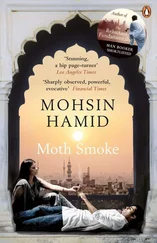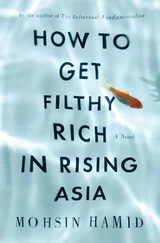I fell silent. I am, as you can see, normally quite happy to chat, but in that moment I did not know what to say. I watched him watch me, trying to understand what he was looking for. He glanced down at my resumé, which was lying between us on the table, and then back up again. His eyes were cold, a pale blue, and judgmental, not in the way that word is normally used, but in the sense of being professionally appraising, like a jeweler’s when he inspects out of curiosity a diamond he intends neither to buy nor to sell. Finally, after some time had passed — it could not have been more than a minute, but it felt longer — he said, “Tell me something. Where are you from?”
I said I was from Lahore, the second largest city of Pakistan, ancient capital of the Punjab, home to nearly as many people as New York, layered like a sedimentary plain with the accreted history of invaders from the Aryans to the Mongols to the British. He merely nodded. Then he said, “And are you on financial aid?”
I did not answer him at once. I knew there were subjects interviewers were not permitted to broach — religion, for example, and sexual orientation — and I suspected financial aid was one of these. But that was not why I hesitated; I hesitated because his question made me feel uncomfortable. Then I said, “Yes.” “And isn’t it harder,” he asked, “for international students to get in if they apply for aid?” Again I said, “Yes.” “So,” he said, “you must have really needed the money.” And for the third time, I said, “Yes.”
Jim leaned back in his chair and crossed his legs at the knee, just as you are doing now. Then he said, “You’re polished, well-dressed. You have this sophisticated accent. Most people probably assume you’re rich where you come from.” It was not a question, so I made no reply. “Do your friends here know,” he went on, “that your family couldn’t afford to send you to Princeton without a scholarship?”
This was, as I have said, the most important of my interviews, and I knew moreover that I ought to remain calm, but I was getting annoyed, and I had had enough of this line of questioning. So I said, “Excuse me, Jim, but is there a point to all this?” It came out more aggressively than I intended, my voice rising and taking on an edge. “So they don’t know,” Jim said. He smiled and went on, “You have a temper. I like that. I went to Princeton, too. Class of ‘81. Summa cum laude.” He winked. “I was the first guy from my family to go to college. I worked a night shift in Trenton to pay my way, far enough from campus that people wouldn’t find out. So I get where you’re coming from, Changez. You’re hungry, and that’s a good thing in my book.”
I was, I must confess, caught off balance. I did not know how to react. But I did know that I was impressed with Jim; he had, after all, seen through me in a few minutes more clearly than had many people who had known me for years. I could understand why he would be effective at valuations, and why — by extension — his firm had come to be highly regarded in this field. I was also pleased that he had found in me something he prized, and my confidence, until now shaken by our encounter, began to recover.
It is worth, if you will permit me, my indulging in a minor digression at this point. I am not poor; far from it: my great-grandfather, for example, was a barrister with the means to endow a school for the Muslims of the Punjab. Like him, my grandfather and father both attended university in England. Our family home sits on an acre of land in the middle of Gulberg, one of the most expensive districts of this city. We employ several servants, including a driver and a gardener — which would, in America, imply that we were a family of great wealth.
But we are not rich. The men and women — yes, the women, too — of my household are working people, professionals. And the half-century since my great-grandfather’s death has not been a prosperous one for professionals in Pakistan. Salaries have not risen in line with inflation, the rupee has declined steadily against the dollar, and those of us who once had substantial family estates have seen them divided and subdivided by each — larger — subsequent generation. So my grandfather could not afford what his father could, and my father could not afford what his father could, and when the time came to send me to college, the money simply was not there.
But status, as in any traditional, class-conscious society, declines more slowly than wealth. So we retain our Punjab Club membership. We continue to be invited to the functions and weddings and parties of the city’s elite. And we look with a mixture of disdain and envy upon the rising class of entrepreneurs — owners of businesses legal and illegal — who power through the streets in their BMW SUVs. Our situation is, perhaps, not so different from that of the old European aristocracy in the nineteenth century, confronted by the ascendance of the bourgeoisie. Except, of course, that we are part of a broader malaise afflicting not only the formerly rich but much of the formerly middle-class as well: a growing inability to purchase what we previously could.
Confronted with this reality, one has two choices: pretend all is well or work hard to restore things to what they were. I chose both. At Princeton, I conducted myself in public like a young prince, generous and carefree. But I also, as quietly as I could, held down three on-campus jobs — in infrequently visited locations, such as the library of the Program in Near Eastern Studies — and prepared for my classes throughout the night. Most people I met were taken in by my public persona. Jim was not. But fortunately, where I saw shame, he saw opportunity. And he was, in some ways but not in all — as I would later come to understand — correct.
Ah, our tea has arrived! Do not look so suspicious. I assure you, sir, nothing untoward will happen to you, not even a runny stomach. After all, it is not as if it has been poisoned. Come, if it makes you more comfortable, let me switch my cup with yours. Just so. How much sugar would you like? None? Very unusual, but I will not insist. Do try these sticky, orange sweets — jalebis — but be careful, they are hot! I see you approve. Yes, they are delicious. It is curious how a cup of tea can be refreshing even on a warm day such as this — a mystery, really — but there you have it.
I was telling you about my interview with Underwood Samson, and how Jim had found me to be, as he put it, hungry. I waited to see what he would say next, and what he said next was this: “All right, Changez, let’s test you out. I’m going to give you a business case, a company I want you to value. You can ask me anything you need to know — think Twenty Questions — and you can do your calculations with that pencil and paper. Ready?” I said that I was, and he continued: “I’m going to throw you a curve ball. You’re going to need to get creative here. The company is simple. It has only one service line: instantaneous travel. You step into its terminal in New York, and you immediately reappear in its terminal in London. Like a transporter on Star Trek. Get it? Good. Let’s go.”
I would like to think that I was, in that moment, outwardly calm, but inside I was panicking. How does one value a fictitious, fantastic company such as the one he had just described? Where does one even begin? I had no idea. I looked at Jim, but he did not seem to be joking. So I inhaled and shut my eyes. There was a mental state I used to attain when I was playing soccer: my self would disappear, and I would be free, free of doubts and limits, free to focus on nothing but the game. When I entered this state I felt unstoppable. Sufi mystics and Zen masters would, I suspect, understand the feeling. Possibly, ancient warriors did something similar before they went into battle, ritualistically accepting their impending death so they could function unencumbered by fear.
Читать дальше












